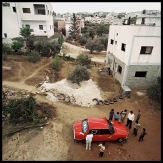|
They are respectively 17 and 22 years old,
and a checkpoint divides them. Only war, bleakness and
grief surround them. They were born into this desolation, and
have grown up and met one another in this setting. Their
future is impossible to determine. They have been living
under curfew for 89 days. Maysan lives with her parents
in Nablus, while Sliman, ten kilometers away, lives in the
village of Salem. Before the curfew, he was a taxi
driver. Now, all he can do is wait and see what happens
next. Despite the poverty, the danger, the curfew, and risk of
terrorist attacks, the young couple has decided to get
married, and the wedding did take place. What does it
mean to marry in wartime? The atmosphere is troubled, the joy
tarnished, darkened by desperation. There is no music, no
electricity, very few yodels proffered by the women to
encourage the newlywed’s future happiness. Israeli
soldiers surround the village, and the ceremony is held during
the day, for by night it would be too dangerous. About
fifteen friends gather around the table, no more.
All are dressed in ordinary clothing, and only a few car horns
toot to express a smattering of symbolic joy. As if the
wedding itself took place at that very instant, when the
about to be wed husband came to get his wife to be at the
other side of the check point... Not a single sound breaks the
silence of members of the wedding as they troop along the
gravel path. The soldiers don’t react when the
young newlyweds, hand in hand, stroll by an Israeli tank. Love,
a fragile tie, seems stronger than the conflict, if only
for a moment. The young man’s frozen face seems to
indicate that the most difficult moments will come later.
The wedding represents a union, but also a split. By marrying
Sliman, Maysam must break off from her own family,
her parents and brothers. She does not know when
she will be able to see them again. They are not allowed to
leave their village. Between them stands an invisible
wall of uncertainly which is ten km long. On one side
there is celebration, on the other - nothing. Only one half
of a party is nonetheless a
celebration, and the protagonists
pretend that everyone is there, that
all is well. Even Sliman’s martyred brother
(Chalid) is there,
|
|
his photographic portrait on the rear
window of the decorated taxi cab. The newlyweds get into
the car, and make a double lap of honor around the
military zone and checkpoint. The scene seems unreal,
even absurd. About fifty meters from the house, the car comes
to a stop. The remainder of the trajectory is made on
foot. The couple is greeted with “hurrays” from
family, friends and neighbors. Most of them are women.
Outside of the procession, the streets are deserted. The
newlywed husband is immediately jacked up onto his
cousin’s shoulders as the women sing and dance. On
the threshold, Maysam tosses a handful of white flour
paste towards the door. If the mixture sticks to the
doorway, it means that the couple will be a happy one and
will have children. If not, the worst is to come. Of
course, the doughy substance sticks. The women pull
Maysam upstairs to the first floor, where she discovers their
new bedroom and quarters. The area reserved to the
newlyweds measures 20 square meters, a double bed on a
wooden bed base, a wardrobe containing all of the garments
purchased for her by her new husband, as well as a
mirror, a small television set and a washroom area. The
group returns to the living room. The newlyweds are seated on a
platform. A musician picks up his instrument, a
darbouka, and the traditional song he begins to sing soon
fills the room. Everyone gathers around the newlyweds with
wishes for peace, proffering congratulations and
“many children”, “a good life”
“a life in peace”. A woman walks around the
room, showing off the Sliman’s gift to his new
wife. Delicately set on a cushion of white satin lays a gold
plated necklace. There is no display of wealth at this
wedding, no opulence. No sheep has been slaughtered for
the festive meal, and only a single course is served: rice
with milk and chicken. The children eat their fill, as do
the guests. At least the war cannot prevent them from
enjoying this simple feast.
PHOTOS : © YOUSSEF BOUDLAL
TEXT : © AUDE BOISSAYE
|








